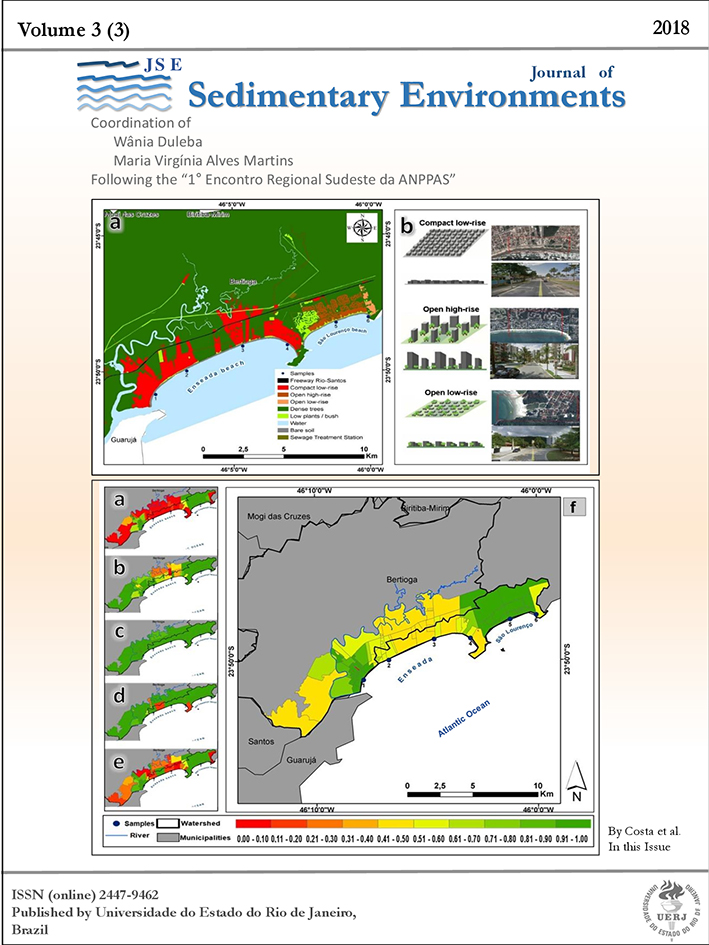A REVIEW OF SUSTAINABILITY OF URBAN DRAINAGE SYSTEM: TRAITS AND CONSEQUENCES / REVISÃO DA SUSTENTABILIDADE DE UM SISTEMA DE DRENAGEM URBANA: CARACTERÍSTICAS E CONSEQÜÊNCIAS
DOI:
https://doi.org/10.12957/jse.2018.37825Keywords:
Environmental quality. Jimma city. Sustainable drainage. Water quantity and quality. / Palavras-chave, Qualidade ambiental. Cidade de Jimma. Drenagem sustentável. Quantidade e qualidade de água.Abstract
The negative effect of domestic effluents on the quantity and quality of water and urban amenities makes increasingly imperative to establish sustainable drainage systems in cities. Therefore, for a better plan and sustainable development of a town, it is highly imperative for environmentalists, hydrologists, land use planners and for storm and wastewater management to analyze the existing drainage system and predict the environmental responses to the discharges of urban drainage system. This study has analyzed the existing drainage system of Jimma city (Ethiopia) and identified the major factors contributing to the poor drainage performance. Jimma population growth has been increasing the problems caused by the uncontrolled release of domestic effluents and urban solid waste, with increasingly damaging consequences for the environmental quality, social wellness and economy of the city. With the intensification of Jimma development, surface water discharges from developed areas and uncontrolled wastes are being increasingly released, affecting social, environmental and economic state of the city. Lack of proper functioning drainage infrastructure, uncontrolled waste disposal, lack of periodic inspection and maintenance, poor connection of drainage networks and roads and carelessness led to the failure of the existing drainage system. These conditions caused drainage blockages, resulting in overflows and floods, leading to less and less attractive conditions in the city and making some places unfit to be inhabited.
Resumo
O efeito negativo dos efluentes domésticos sobre a quantidade e a qualidade da água e o bem estar urbano torna cada vez mais imperioso o estabelecimento de sistemas sustentáveis de drenagem. Por isso, a análise do sistema de drenagem existente e a previsão das respostas ambientais às descargas urbanas são altamente imperativas tendo em vista um melhor planejamento e desenvolvimento sustentável de uma cidade. Este estudo analisou o sistema de drenagem da cidade de Jimma (Etiópia) e identificou os principais fatores que contribuem para o seu mau funcionamento. O crescimento populacional de Jimma tem vindo a ampliar os problemas causados pela libertação descontrolada de efluentes domésticos e resíduos sólidos urbanos, com consequências cada vez mais nefastas para a qualidade ambiental, para o bem estar social e a economia da cidade. O funcionamento inadequado da infraestrutura de drenagem, o descarte descontrolado de resíduos sólidos urbanos e a falta de inspeção e manutenção periódicas, a conexão deficiente de redes de drenagem e estradas e o descuido conduziram á inoperância do sistema de drenagem existente. Estas condições causaram bloqueios de drenagem, resultando em transbordamentos e inundações, tornando a cidade cada vez menos atrativa e tornando alguns locais impróprios para ser habitados.
Downloads
Published
Issue
Section
License

Journal of Sedimentary Environments (JSE) is licensed under a Creative Commons Attribution-Noncommercial-Share Alike 4.0 International License.

